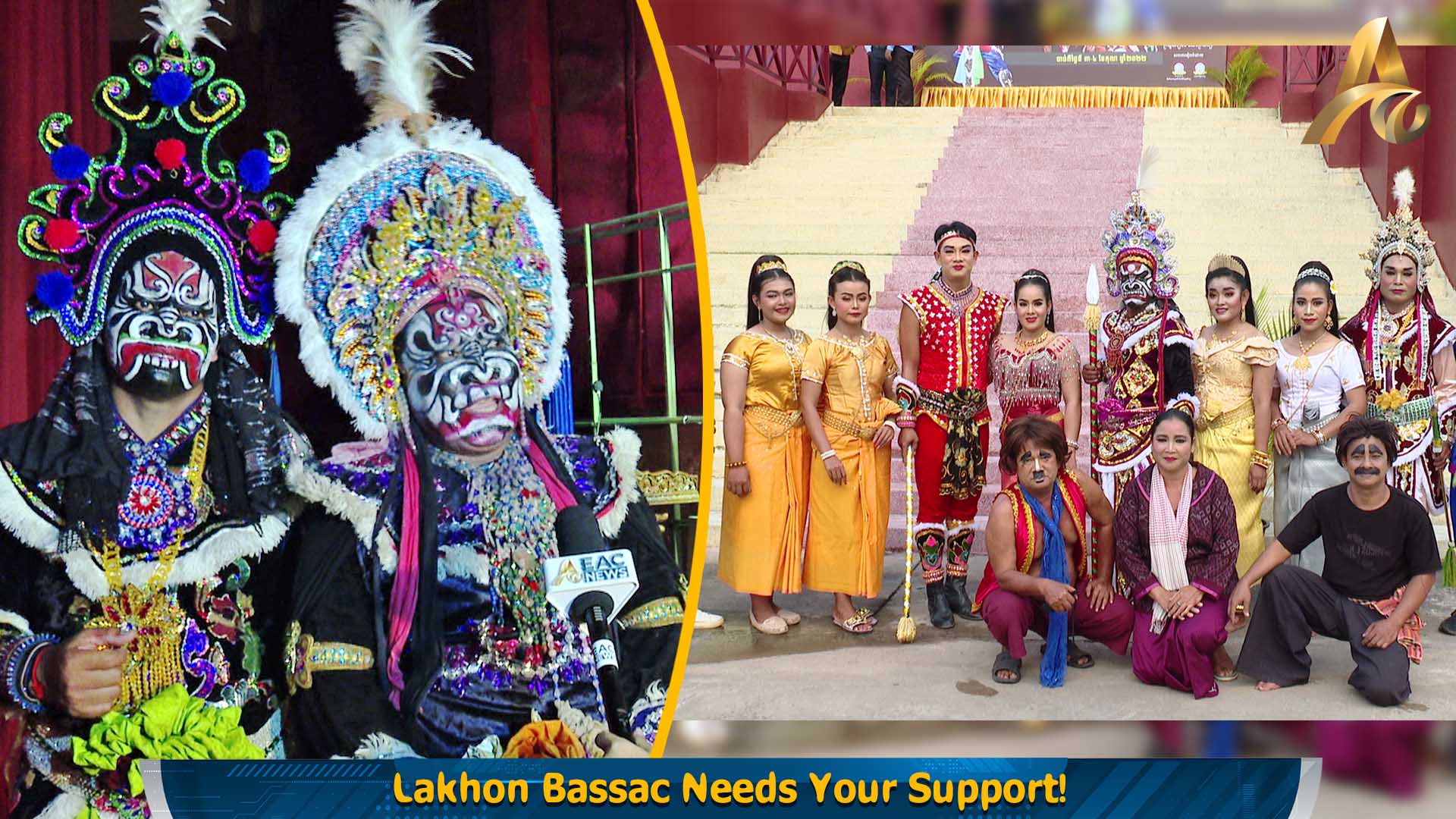PHNOM PENH: Lakhon Bassac is a traditional Khmer spoken and sung theater, largely inspired by the Beijing Opera, and initially created in Kampuchea Krom. This theater was popularized mainly in the villages and pagodas, and is one of the most extravagant artforms in Cambodia, mixing, singing, acting, and martial arts along with live music.
Lakhon Bassac adapts epic Khmer fables for the stage, with one story traditionally lasting for several days. However, in the present day, these stories are often condensed down and performed in small snippets.
Earlier this month, the Ministry of Culture and Fine Arts hosted a Lakhon Bassac festival with the hopes of reinvigorating interest in the art form. After a preliminary qualification period, the top five theater troupes from all across Cambodia came to Phnom Penh to compete in the finals.
Sieng Sophal, aka Ta Pangpos, has performed Lakhon Bassac professionally for over 37 years, and for over 41 years in total. He said he loves all types of art, but his favorite by far is Lakhon Bassac. When his troupe came to Phnom Penh from Kampong Cham to compete in the National Lakhon Bassac Festival, the provincial governor and other kind donors provided them with financial support for the cost of travel, room and board, so that they could focus on rehearsals.
He said, “The [Kampong Cham] governor helped take care [of us] and other donors also helped, little as it may be, they still had the heart to donate as well. The rest [of our finances] the governor helped take care of, like our [cost of] traveling, eating and such. So, we, the artists are happy to see that he [acknowledged and] helped take care [of us].”
He added that it did not matter to him if his troupe won or lost, the whole experience of coming to the festival and meeting other artists was enough.
He said, “Coming here [to compete], win or lose, I don’t mind because meeting artists from around the country has made me happy, sharing our experiences with each other. Winning normally [depends on] the judges’ score. If think in percentage, we probably have a 60% [chance of winning].”
Ta Pangpos' troupe ended up winning second place.
Speaking with Ol Sam Ang, a member of the Phnom Penh troupe that came in third place, he said he loves performing in villages because the people there still have a lot of love for this performing art. While the villages may not be as technologically advanced as the capital city, performing there gives him hope for the preservation of the artform. Although it has been challenging to maintain the popularity of Lakhon Bassac in the modern age, he said he still has faith in the people.
He said, “In the modern age, this artform, Lakhon Bassac, is close to being lost, and the popularity has gone down considerably. I think that if everyone does not show their support and does not join [in on watching our performances], then who will hire us? I believe that there are people who love the country and are committed to loving cultural arts.”
He said that he studied for many years to be the leading man in their performances. In order to be qualified for the leading role, he needed to study singing, his tone of voice and rhythm, as well as stage combat. Most of all, he said he has to hold himself to the utmost standard of morality and integrity.
Like Ol Sam Ang, the giant characters in his Lakhon Bassac troupe also require a distinct performance quality. The three giants named Yak Chen, Yak Chomnab, and Yak Rith are traditionally performed together. The actors playing the giants said they learnt how to perform and put their own makeup on from different teachers, and have fond memories of performing in villages. Their favorite memories include seeing children run away crying from how they look in their stage costumes. To play the Yak giant characters, the actors had to go through grueling training, as not all body types are able to play these roles. Yak Chen recounted his days of training and how he eventually came to be able to produce the giant’s bellowing voice.
He said, “[The teachers] told me to submerge myself in a water basin. I would carry about eight large buckets of water to the water basin in my house. Once I would submerge my head under the water, I would scream. Scream under water. Scream until my voice changed. I couldn’t speak for four to five days. Couldn’t speak loudly and I sounded like a duck... [Whether you are] big or small, [it doesn’t matter] as long as you can use a big voice for Yak. Some can use a big voice for a scene or two and then switch back to a normal human voice. So what they need is someone like us three. From beginning to end, [someone who] can maintain this big voice.”
Ta Pangpos said he hopes that the next generations of Cambodians would help to preserve this tradition that has been passed down from ancestors. He hopes that if the young people have interest, they will attend arts schools to learn about this artform, because the performing arts are alive and present in everything we do.
He said, “Do not think that [art schools and art centers] have no benefits or are useless. Because everything that we do is related to the arts and culture, even when our kids get married, you also need [performing arts], when you host a variety of events, you also need [performing arts] like Aa-yai singing, which is an artform.”
The Ministry of Culture and Fine Arts has expressed great hope that the national Lakhon Bassac festival will be able to generate new interest in the artform, and plans to organize this festival annually. Hoping that the next generation will be able to see the important value of this art form and able to help to preserve this culture.




























